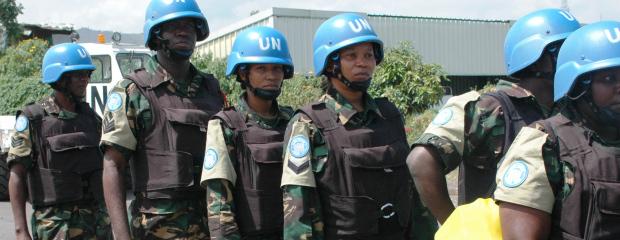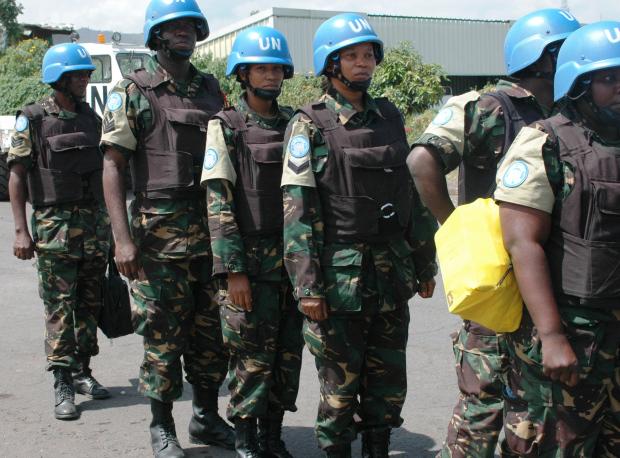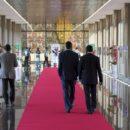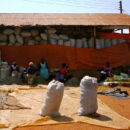Peacekeepers in Congo: Changing the Mandate – By Timo Muller


Force Intervention Brigade troops arrive in Goma, Democratic Republic of the Congo. (UN Photo Library/Clara Padovan).
Members of the United Nations Security Council will convene this Thursday in New York to discuss the performance of MONUSCO – the peacekeeping mission in the Democratic Republic of Congo – and ultimately renew its mandate. With tensions rising in the central African country, it is pivotal that the peacekeepers are given a clear mandate that accounts for the latest developments and the failures of the past year.
Protection of Civilians and the Force Intervention Brigade
The principal objective of MONUSCO is the protection of civilians. After the debacle of losing the provincial capital of Goma to the M23 rebels in late 2012, the Council had authorized the deployment of a 3,000-man strong Force Intervention Brigade (FIB) to neutralise armed groups. Its track-record over the past two years is mixed. While it helped the Congolese army defeat the M23, it was sidelined in fighting the ADF rebels, manipulated in confronting the APCLS rebel groups, and made to believe that it could yield substantial results battling the NDC rebels (when it could not).
For two years in a row, the Security Council has given the FIB explicit authority to undertake unilateral action against armed groups when deemed appropriate and necessary. What many forget, however, is that any unilateral action is unlikely to be politically expedient. Going into war alone would delineate and strain the relationship with the Congolese government. This is one of the reasons why the mission has so far abstained from using its full power, trying to balance its already tense relationship with Kinshasa, which maintains its sovereign right to launch unilateral operations (as has recently been the case against the FDLR rebels).
Despite this political reality, the Council will likely copy-and-paste the language from last year’s mandate, simply to give the mission a bargaining chip in further discussions with the government. Nonetheless, it is important to remember the limits of MONUSCO’s military engagement. As one member of the mission’s leadership admitted to me: “Militarily speaking, unilateral operations are nonsense. We can clear an area [of rebels] but we need the government to hold and build it.”
MONUSCO has largely been sceptical of unilateral action and failed to see its necessity in autumn last year when a spree of brutal machete attacks killed hundreds of people. MONUSCO should have acted unilaterally when it became increasingly clear that elements of the Congolese government and military might be complicit in these attacks, be it by commission or omission. As weeks passed, MONUSCO did not just fail to act unilaterally, it failed to act in a meaningful way altogether, partially because the FIB is not fully integrated into the wider MONUSCO structure.
Contrary to a widely held belief and public statements by the mission’s leadership, the FIB and the rest of MONUSCO’s military – the so-called ‘Framework Forces’ – are two distinct entities. Denying this fact has already hampered information-sharing and overall coordination, to the detriment of military operations.
Worse, the lack of unity has led members of the FIB to believe that they are deployed solely to do the “dirty job,” leaving the “soft stuff with civilians” to the “other MONUSCO,” as one FIB officer remarked to me. The framework forces, in turn, are increasingly tempted to outsource military engagement to the FIB, even when an incident is simply related to petty crime. As a result, it is sometimes unclear who is responsible for the protection of civilians (the core task of the mission.)
This, however, does not suggest that troop-contributing countries of the FIB truly honor their commitment to neutralise armed groups and ultimately protect civilians. Due to a combination of geopolitical interests and a lack of political will, the engagement of the troop contributing countries (Malawi, South Africa, and Tanzania) has gradually declined since the demise of M23. The Council should press these countries to make good on their previous commitments. It is unlikely, however, that New York will consider ending the mandate of the FIB, as recommended recently by the International Crisis Group.
While the FIB is a very important tool and the Council should keep it, MONUSCO needs to undertake a number of configurations to fully integrate the FIB so that it can utilise its full potential. Citizens continue to suffer from widespread violence, as recently reported by Oxfam, and the humanitarian situation remains dire. The Council should also urge peacekeepers to send more personnel to Katanga, where violence displaced hundreds of thousands of people in 2014 (here and here). Largely unnoticed to the world, the province requires much more engagement.
Any military engagement stands and falls depending on available intelligence. While the new ‘drones‘ are useful in providing MONUSCO with a bird’s-eye view, the mission needs better on-the-ground reporting and human intelligence. The Security Council should therefore urge MONUSCO to allocate greater resources and personnel to the Joint Mission Analysis Cell (JMAC) to gather more and better intelligence as well as fully tapping into the knowledge of its Community Liaison Assistants. Cooperation with the United Nations Group of Experts could also be improved.
But collecting more and better intelligence is not sufficient if it neglects or even ignores important conflict drivers, including but not limited to land issues, inter-community conflicts and the illegal exploitation of natural resources. They are important for sustainable peace but do not feature prominently in MONUSCO’s conflict analysis.
Elections and Good Offices
As Congo analyst Jason Stearns noted in a recent article, the conflict in the DR Congo is increasingly changing “from bullets to ballots.” With a series of elections scheduled for the next two years, the political establishment of Congo is consumed by political bickering and strategic positioning for greater influence. Election-related violence erupted earlier this year across the country and is likely going to increase in the lead-up to the national elections at the end of next year.
While it is unclear whether elections will actually be held on time, MONUSCO needs to decide early when and how it would support the election process. Congo’s infrastructure is seriously debilitated and poses a challenge for the holding of elections, which are said to cost more than $US 1 billion. The international community will likely have to foot part of that bill, with MONUSCO taking care of some of the logistical legwork. One Complication is the fact that the mission has relocated most of its personnel to the east of the country and would need to redeploy some of its assets to cover the whole of Congo during the election period.
Next to logistical support, MONUSCO requires more police officers to respond to election-related demonstrations. Leaving it solely to Congo’s weak police, well-known for their abuses, to restore the rule of law will likely cause greater violence.
In addition, the United Nations Secretary-General rightly noted that “[p]olitically motivated manipulation of armed groups was viewed as an increasing phenomenon in the pre-elections context.” To help prevent “rebels in suits” from entering the electoral race, MONUSCO does not so much need a peacekeeping method, but a policing approach to mafia networks.
But above all, elections will require increased political engagement by MONUSCO. For a peacekeeping mission, that is a very difficult undertaking for which its chief, Martin Kobler, may not be well-suited. On top of that, it might be necessary to keep more senior management in Kinshasa to engage in meaningful dialogue with the government. Unfortunately, most of MONUSCO’s leadership is going to leave in the coming months.
Regional Cooperation
Council members must also remind MONUSCO to use its good offices to reinvigorate the Peace, Security, and Cooperation Framework, a regional peace agreement established in February 2013. Progress largely stalled over the preceding year. The Security Council should urge all regional governments to remain fully committed to the implementation of the PSC Framework. In particular, it should call upon all involved parties to accelerate the so-called Nairobi Declarations to resolve the M23 rebel group once and for all.
The elephants in the room: DDR, SSR, and Stabilization
In 2014, the Government of Congo missed a crucial opportunity to provide a robust Disarmament, Demobilization, and Reintegration (DDR) programme to more than 4,000 rebels that had surrendered in late 2013 and early 2014. Unable to agree with international donors about the necessary funding, the rebels and their dependents have been left in make-shift camps in remote parts of the country. In October 2014, Human Rights Watch reported that more than 100 men, women, and children died of starvation and disease. Any military victory over armed groups such as ADF, FRPI or NDC will be futile if it is not accompanied by meaningful alternatives for the combatants.
The Security Council should thus urge the government to take immediate steps to implement a DDR program and follow through with security sector reform (SSR), in particular the creation of a Rapid Reaction Force. While the government has established the necessary legal framework for SSR, it has yet to operationalise it and put in place concrete action. That said, SSR is extremely political and given the current political environment is possibly already dead in the water.
In addition, Council members must call upon MONUSCO to treat stabilisation efforts as not merely a technical issue but as a deeply political one. In addition, they should mandate MONUSCO to harmonise existing stabilisation initiatives such as STAREC, I4S and Islands of Stability, which currently lack a common concept.
The Future of MONUSCO
MONUSCO cannot stay in Congo forever and is therefore already developing an exit strategy to phase out its operations and transition its tasks to the UN Country Team. In March, it will likely reduce its troops by 2,000. Members of the Security Council must clarify that any exit strategy must be gradual, progressive and based upon clear benchmarks. MONUSCO currently lacks a robust and strategic framework, however, while the government of Congo has yet to present a clear vision for how it will resume full responsibilities. A hasty departure does not benefit either party. The UN Country Team, in particular, should increasingly focus on good governance activities, which are essential for securing long-term stability, as recently reported by International Alert.
Timo Mueller is a freelance researcher in eastern Congo. @MuellerTimo You can live-stream the UNSC briefing on Thursday morning (EST) here.





